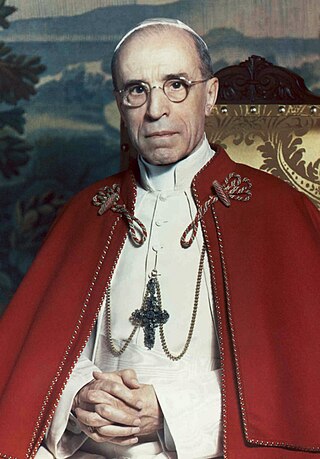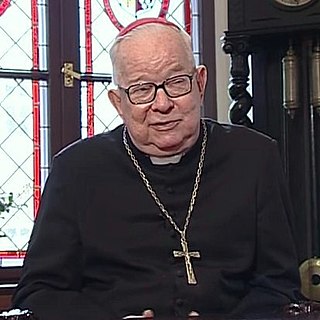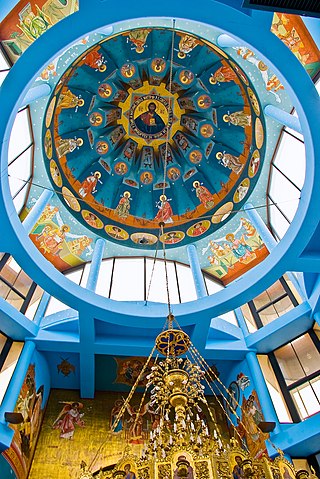
Pope John Paul II was head of the Catholic Church and sovereign of the Vatican City State from 1978 until his death in 2005.

Pope Pius XII was head of the Catholic Church and sovereign of the Vatican City State from 2 March 1939 until his death in October 1958. Before his election to the papacy, he served as secretary of the Department of Extraordinary Ecclesiastical Affairs, papal nuncio to Germany, and Cardinal Secretary of State, in which capacity he worked to conclude treaties with various European and Latin American nations, including the Reichskonkordat treaty with the German Reich.

Pope John Paul I was head of the Catholic Church and sovereign of the Vatican City from 26 August 1978 until his death 33 days later. His reign is among the shortest in papal history, resulting in the most recent year of three popes and the first to occur since 1605. John Paul I remains the most recent Italian-born pope, the last in a succession of such popes that started with Clement VII in 1523.

Stanisław Jan Dziwisz is a Polish prelate of the Catholic Church. He served as Metropolitan Archbishop of Kraków from 2005 until 2016. He was created a cardinal in 2006. He was a long-time and influential aide to Pope John Paul II, a friend of Pope Benedict XVI, and an ardent supporter of John Paul II's beatification.

Stefan Wyszyński was a Polish prelate of the Catholic Church. He served as Bishop of Lublin from 1946 to 1948, Archbishop of Warsaw and Archbishop of Gniezno from 1948 to 1981. He was created a cardinal on 12 January 1953 by Pope Pius XII. He assumed the title of Primate of Poland.

On 2 April 2005, Pope John Paul II died at the age of 84. His funeral was held on 8 April, followed by the novendiales devotional in which the Catholic Church observed nine days of mourning.

Henryk Roman Gulbinowicz was a prelate of the Catholic Church who served as Archbishop of Wrocław from 1976 to 2004. Pope John Paul II made him a cardinal in 1985. In 2020, he was banned from making public appearances following a Holy See investigation that confirmed allegations that he had committed sexual abuse and evidence that he had been a secret police informant from 1969 to 1985. Following his death, Gulbinowicz was forbidden to have his funeral service at the city’s Cathedral of St. John the Baptist or to be buried in the cathedral.

Pope John Paul II is a 1984 American biopic drama television film based on the life of Karol Wojtyła, from his early days as an activist in Poland to his installation as Pope John Paul II. Written by Christopher Knopf and directed by Herbert Wise, the film stars Albert Finney, Caroline Bliss, Brian Cox, and John Forgeham. The film marks both Albert Finney's American television debut and the first script Finney had ever turned down upon initial reading.

Pope John Paul II is a 2005 television miniseries dramatizing the life of Pope John Paul II from his early adult years in Poland to his death at age 84.
Redemptor hominis is the name of the first encyclical written by Pope John Paul II. It lays a blueprint for his pontificate in its exploration of contemporary human problems and especially their proposed solutions found in a deeper understanding of the human person. The encyclical was promulgated on 4 March 1979, less than five months after his installation as pope.
Persecutions against the Catholic Church took place during the papacy of Pope Pius XII (1939–1958). Pius' reign coincided with World War II (1939–1945), followed by the commencement of the Cold War and the accelerating European decolonisation. During his papacy, the Catholic Church faced persecution under Fascist and Communist governments.
Pope Pius XII and Poland includes Church relations from 1939 to 1958. Pius XII became Pope on the eve of the Second World War. The invasion of predominantly Catholic Poland by Nazi Germany in 1939 ignited the conflict and was followed soon after by a Soviet invasion of the Eastern half of Poland, in accordance with an agreement reached between the dictators Joseph Stalin and Adolf Hitler. The Catholic Church in Poland was about to face decades of repression, both at Nazi and Communist hands. The Nazi persecution of the Catholic Church in Poland was followed by a Stalinist repression which was particularly intense through the years 1946–1956. Pope Pius XII's policies consisted in attempts to avoid World War II, extensive diplomatic activity on behalf of Poland and encouragement to the persecuted clergy and faithful.
As one of the best known and well-travelled people of the 20th century, there are many cultural references to Pope John Paul II, who was the 264th Pope of the Roman Catholic Church from 16 October 1978 until his death in April 2005. He was the second-longest reigning pontiff, having served for 27 years, short of Pius IX's 31 years. In addition to his own extensive writings, many films, television programs, books, and journal articles have been written about John Paul II.

The Pope John Paul II bibliography contains a list of works by Pope John Paul II, and works about his life and theology.

Pope John Paul II's political views were considered conservative on issues relating to reproduction and the ordination of women during his 26-year reign as pope of the Roman Catholic Church and sovereign of Vatican City. A series of 129 lectures given by John Paul during his Wednesday audiences in Rome between September 1979 and November 1984 were later compiled and published as a single work entitled ‘Theology of the Body’, an extended meditation on the nature of human sexuality. He also extended it to condemnation of abortion, euthanasia and virtually all uses of capital punishment, calling them all a part of the "culture of death" that is pervasive in the modern world, advocating instead what he understood to be a "culture of life". He campaigned for world debt forgiveness and social justice.
Pope John Paul II worked to improve relations between the Roman Catholic Church and Judaism. He built solid ties with the Jewish community in the hope of promoting Christian–Jewish reconciliation.

Holy See–Soviet Union relations were marked by long-standing ideological disagreements between the Catholic Church and the Soviet Union. The Holy See attempted to enter in a pragmatic dialogue with Soviet leaders during the papacies of John XXIII and Paul VI. In the 1990s, Pope John Paul II's diplomatic policies were cited as one of the principal factors that led to the dissolution of the Soviet Union.

Zygmunt Szczęsny Feliński was a professor of the Saint Petersburg Roman Catholic Theological Academy, Archbishop of Warsaw in 1862-1883 ,and founder of the Franciscan Sisters of the Family of Mary. He was canonised on 11 October 2009 by Pope Benedict XVI.
The Polish anti-religious campaign was initiated by the Communist government in the Polish People's Republic which, under the doctrine of Marxism, actively advocated for the disenfranchisement of religion and planned atheisation. To this effect the regime conducted anti-religious propaganda and persecution of clergymen and monasteries. As in most other Communist countries, religion was not outlawed as such and was permitted by the constitution, but the state attempted to achieve an atheistic society. The Catholic Church, as the religion of most Poles, was seen as a rival competing for the citizens' allegiance by the government, which attempted to suppress it.

Anti-Catholicism in the Soviet Union, including the Soviet Anti-Catholic Campaigns, refer to those concerted efforts taken by the Soviet Union to defame, undermine, or otherwise decrease or limit the role of the Catholic Church in Europe.















